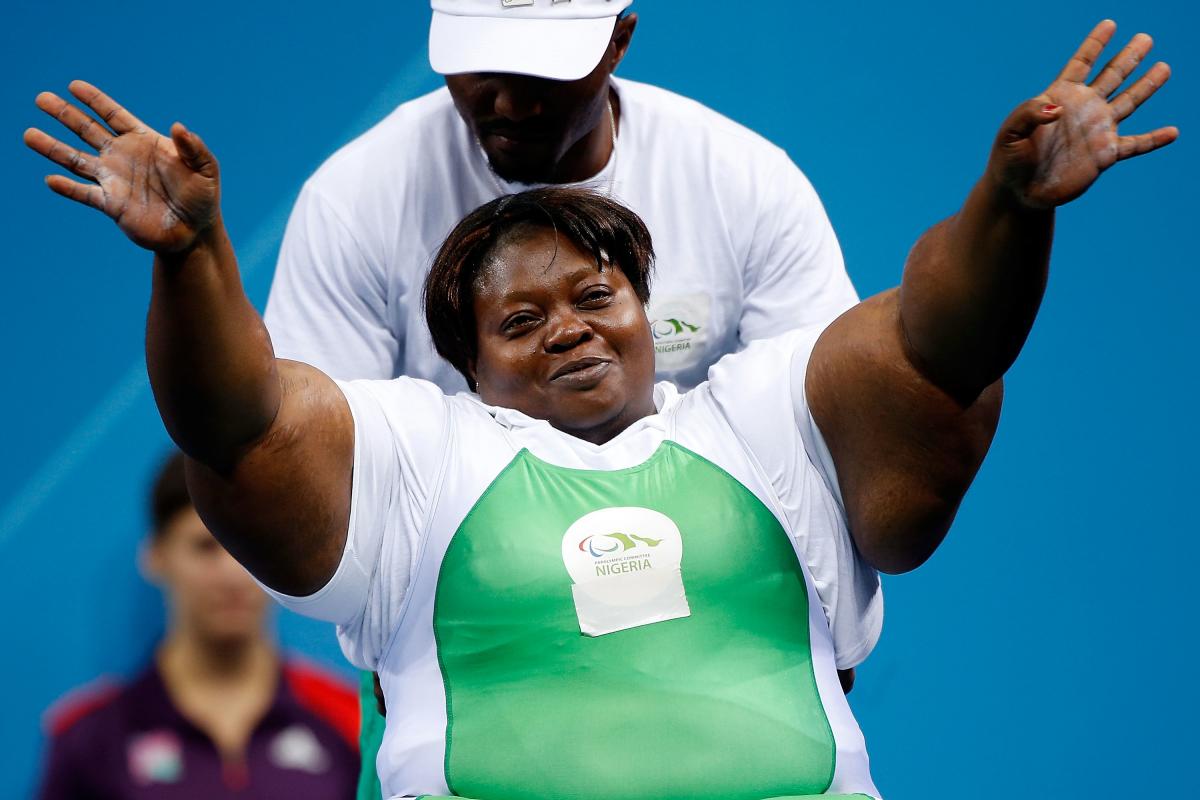Egypt, Nigeria and Iran power their way to glory
On the final day of powerlifting at London 2012, Asian and African nations showed their dominance once again. 05 Sep 2012
Nigerian powerlifter Grace Anozie at London 2012
“Now I think we are the number one country in the world in powerlifting.”
On the final day of powerlifting at London 2012 on Wednesday (5 September) the last remaining medals were decided in the men’s -100kg, women’s +82.50kg and men’s +100kg categories, respectively.
Men’s -100kg
A two-way battle ensued between two giants of the sport in the day’s opening event. Egypt’s Mohamed Eldib narrowly edged out China’s Qi Dong in a phenomenal series of lifts.
In the third round, Eldib and Qi were forced into world record attempts in order to try and secure the gold medal.
With the bar set at 249kg, Eldib successfully set a new world and Paralympic record before facing the agonising wait to see if Qi could better him with a lift of 250kg.
Despite his best efforts, Qi could not complete the lift, meaning Eldib secured Egypt’s fourth powerlifting gold medal of the Games. Qi endeared himself greatly to the crowds and finished with a best lift of 242kg in second.
It was a sensational rivalry, one that was only furthered when Eldib opted to take a fourth lift outside of the competition. He failed to raise the bar at 252kg but it did not dampen the spirits of the passionate crowds who roared both lifters on to great success.
“I am very thrilled to be here at my first Paralympics, win a gold medal and break my own world record,” Eldib said afterwards.
He continued: “Sport runs in my blood and I cannot live without it.”
Bronze was clinched by Iran’s Ali Sadeghzadehsalmani, who finished with a best lift of 235kg.
Women’s +82.50kg
Pre-event favourite Grace Anozie won gold, Nigeria’s sixth of the Games in powerlifting.
Imperious throughout, she lifted 162kg in her second attempt having failed it at the first time of asking.
In her third, with the bar set at 165.50kg, she valiantly failed to beat her own Paralympic record which stands at 165kg from the Beijing 2008 Paralympic Games.
“I feel so great. I feel on top of the world,” said Anozie.
After finishing the powerlifting schedule with six golds, five silvers and one bronze medal, Nigerian coach Mike Ajiboye cited two key factors behind their success.
“It is all down to determination and focus.”
“Now I think we are the number one country in the world in powerlifting,” he explained.
The silver medal was secured by Heba Ahmed, despite the Egyptian withdrawing from the competition after the second round. She finished with a best lift of 140kg before she retired with a ligament injury in her arm.
Perla Barcenas took the bronze medal. The Mexican went for broke with her final lift, but with the bar set at 141kg, she was unable to snatch silver away from Ahmed and had to be content with the bronze.
Men’s +100kg
As expected, Iran’s Siamand Rahman cruised to his first Paralympic gold medal in a magnificent illustration of just why he is powerlifting’s golden boy.
Opening with a Paralympic record of 270kg, he then bettered it with a comfortable lift of 280kg.
With his third attempt he failed to lift 301kg and become the first powerlifter to lift over 300kg in competition, the only disappointment in what was an extremely well contested category.
It was a masterful display from Rahman, who was backed by hundreds of adorning Iranian and non-Iranian fans alike.
Faris Al-Ajeeli took the silver. The Iraqi lifter finished with a best lift of 242kg and whilst he was unable to challenge Rahman, he was never challenged himself for second.
The bronze medal went to South Korea’s Keun Bae Chun who finished with a best lift of 232kg.

 Facebook
Facebook
 Instagram
Instagram
 Twitter
Twitter
 Youtube
Youtube
